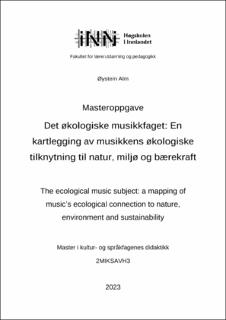| dc.contributor.advisor | | |
| dc.contributor.author | Alm, Øystein | |
| dc.date.accessioned | 2023-07-15T16:10:25Z | |
| dc.date.available | 2023-07-15T16:10:25Z | |
| dc.date.issued | 2023 | |
| dc.identifier | no.inn:inspera:136495109:30896572 | |
| dc.identifier.uri | https://hdl.handle.net/11250/3079241 | |
| dc.description.abstract | Med fagfornyelsen ble bærekraftig utvikling innført som et tverrfaglig tema i læreplanen for den norske skolen. I grunnskolens musikkfag er det derimot ikke eksplisitt nevnt, og musikklærere er derfor ikke forpliktet til å undervise om bærekraftig utvikling. Gjennom å undersøke et spenn av tverrfaglige og teoretiske perspektiver og bruk av ulike metodiske innfallsvinkler, belyses temaet musikk, natur/miljø og bærekraftig utvikling for dens økologiske sammenheng. Oppgaven drar inn teoretiske perspektiver om økologi, bærekraftig utvikling, og ulike tilnærminger til bærekraftundervisning, deriblant pedagogiske forslag fra økomusikkvitenskapelig forskning. Musikk viser seg å være økologisk tilknyttet natur, miljø og bærekraft gjennom ulike dimensjoner. Musikksynet som foreligger i læreplanen for grunnskolen bærer preg av antroposentrisme, som begrenser fagets muligheter for økologisk dannelse. Oppgaven konkluderer med at selv om det gjeldende musikkfaget i grunnskolen har muligheter for å ta opp bærekraftig utvikling, er fagets fulle potensial for bærekraftundervisning kun realiserbart om bærekraftig utvikling blir eksplisitt nevnt i læreplanen. | |
| dc.description.abstract | With the latest curriculum renewal, sustainable development was introduced as an interdisciplinary theme in the Norwegian school curriculum. However, it is not explicitly mentioned in the primary school music subject, and music teachers are therefore not obligated to teach about sustainable development. By examining a range of interdisciplinary and theoretical perspectives and using various methodological approaches, the topic of music, nature/environment, and sustainable development is illuminated in its ecological context. This master thesis draws on theoretical perspectives on ecology, sustainable development, and different approaches to sustainability education, including pedagogical proposals from ecomusicological research. Music is shown to be ecologically connected to nature, the environment, and sustainability through various dimensions. The music perspective in the primary school curriculum is characterized by anthropocentrism, which limits the subject's potential for ecological education. The thesis concludes that even though the current music subject in primary school has the potential to address sustainable development, the subject's full potential for sustainability education can only be realized if sustainable development is explicitly mentioned in the curriculum. | |
| dc.language | nob | |
| dc.publisher | Inland Norway University | |
| dc.title | Det økologiske musikkfaget: En kartleggingen av musikkens økologiske tilknytning til natur, miljø og bærekraft | |
| dc.type | Master thesis | |
